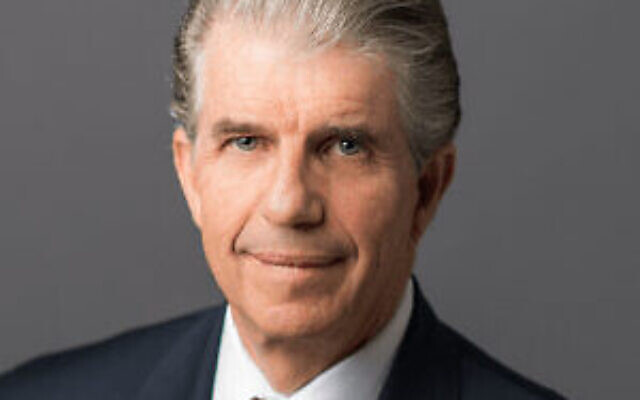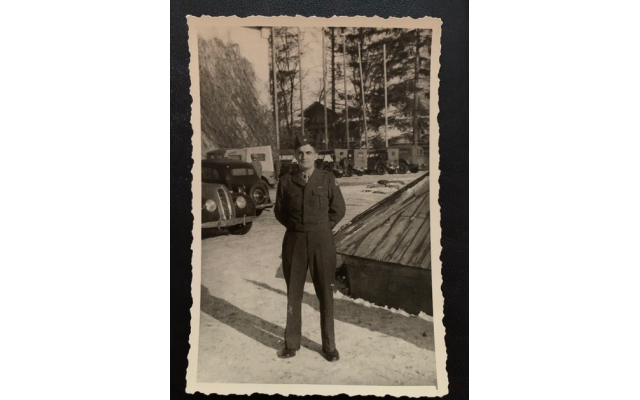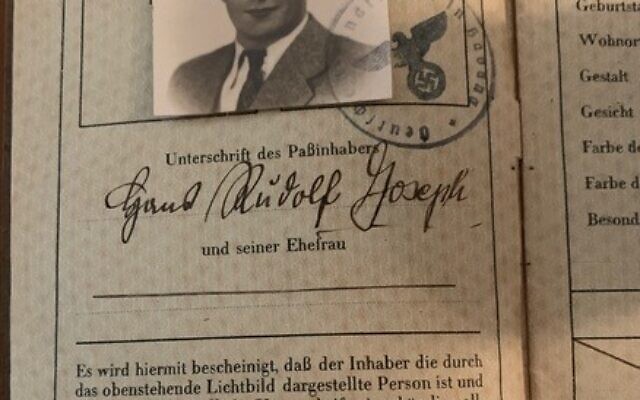Physician Uncovers True Story of Dad’s Heroism
Dr. Frank Joseph has a newfound appreciation for his father’s role in serving in the U.S. military intelligence ‘Ritchie Boys’ unit during WWII.
After 37 years with the Atlanta Journal-Constitution and now with the AJT, , Jaffe’s focus is lifestyle, art, dining, fashion, and community events with emphasis on Jewish movers and shakers.

The CBS program “60 Minutes” recently re-ran a segment on the so-called Ritchie Boys, a U.S. military unit made up of mainly German-speaking immigrants — many of whom were Jews — who heroically served as “secret spies” in World War II, credited for uncovering more than half the intelligence on the Western Front.
Imagine local orthopedist Dr. Frank Joseph’s surprise and awe when he recently discovered that his late father Ralph had been a member of this unit. “My father, Rudolph ‘Ralph’ Joseph, and the other Jewish young men that were members of this elite unit played a key role in helping the Allied Forces win the war,” Joseph said. “They trained at a top-secret military intelligence center at Fort Ritchie in Maryland — thus their nickname, the Ritchie Boys.”
A childhood friend of Joseph’s from California saw the “60 Minutes” segment and emailed Joseph’s tech savvy son, who found Ralph’s name on the official list, confirming the suspicion that he was indeed part of the program. “I was astonished,” Joseph said. “I had no idea. I really think of my father in a very different light since I found out about his role in WWII.”
In June 1942, the U.S. Army began recruiting immigrants, the children of immigrants, refugees, and others with a knowledge of enemy lands and cultures for a special military intelligence group. Trained in the mountains of northern Maryland, they were then sent to Europe and the Pacific. Ultimately, some 15,000 men and women received this specialized training and went on to make vital contributions to victory in World War II.

The army recruited not just those fluent in German, French, Italian, and Polish (approximately a fifth were Jewish refugees from Europe), but also Arabic, Japanese, Dutch, Greek, Norwegian, Russian, Turkish, and other languages, including 200 Native Americans and 200 WACs. Training consisted of photo interpretation, terrain analysis, POW interrogation, counterintelligence, espionage, signal intelligence (including pigeons), mapmaking, intelligence gathering, and close combat. The intelligence later gathered by the Ritchie Boys proved vital during the liberation of Paris and the Battle of the Bulge. They also helped craft the print and radio propaganda that, by many accounts, wore down German morale. If caught, they could have been executed as spies. After the war, they helped with translation and interrogations at the Nuremberg trials.
“Far too often, Jews are portrayed as victims in World War II,” Joseph explained. “But Ralph was born in 1915 and raised in Wurzburg, Germany, in an assimilated German Jewish family. He considered himself ‘German’ first, and his Jewish identity was in many ways an afterthought. As a young man, Ralph heard Hitler deliver a public address. Seeing the writing on the wall, he fled to Italy. Despite having family in the United States, Ralph was repeatedly denied entry here. He ended up living in Cuba for two years, while waiting for permission to enter the United States. He landed in Key West with $20. He joined the Army prior to the start of World War II.”

The elder Joseph had a gift for languages, speaking German, English, Spanish and Italian fluently. After the war, he revealed that he had served as a translator in the Army, which was technically true but only scratched the surface. For decades, some Ritchie Boys didn’t want to discuss their roles in the war, even though they had made significant contributions to the battle against Germany.
Joseph confirmed that after D-Day, his father went to Germany and fought on the frontlines, including the Battle of The Bulge. When the war ended, Ralph left the Army and tried to put his German identity behind him. Joseph’s mother (also a German immigrant) and father wanted their only son to be American. They didn’t speak German at home, ate American food, and in their ongoing attempt to assimilate, became non-practicing Jews, living modestly in a Queens neighborhood heavily populated by immigrants and Jews.
“It would be easy to say that [Ralph] was an accountant — he was not,” Joseph concluded. “He was just a hard-working bookkeeper. My family was very lower-middle class. We were not poor, but money was always a bit tight. Both my parents had heavy German accents, which I actually couldn’t hear. I was amazed at 13 when a friend commented on my mother’s accent. I had no idea. (I thought Lawrence Welk had no accent.) My father died in 1999 at the age of 84. He was a secretive and often difficult man. I am extremely proud of his service.”
- Marcia Caller Jaffe
- Local
- Then & Now
- Dr. Frank Joseph
- U.S. military
- Intelligence
- Ritchie Boys
- World War II
- U.S. Army
- German
- English
- Spanish
- Italian
- Ralph Joseph
- hand/elbow orthopedic specialist
- Resurgens
- 60 Minutes
- secret spies
- German-speaking immigrants
- jews
- Jewish young men
- Allied Forces
- photo interpretation
- terrain analysis
- POW interrogation
- counterintelligence
- espionage
- signal intelligence (including pigeons)
- mapmaking
- intelligence gathering
- close combat
- liberation of Paris
- Battle of the Bulge
- Nuremberg trials
- Wurzburg Germany
- German-Jewish family
- D-Day
- Cuba
- Key West



comments